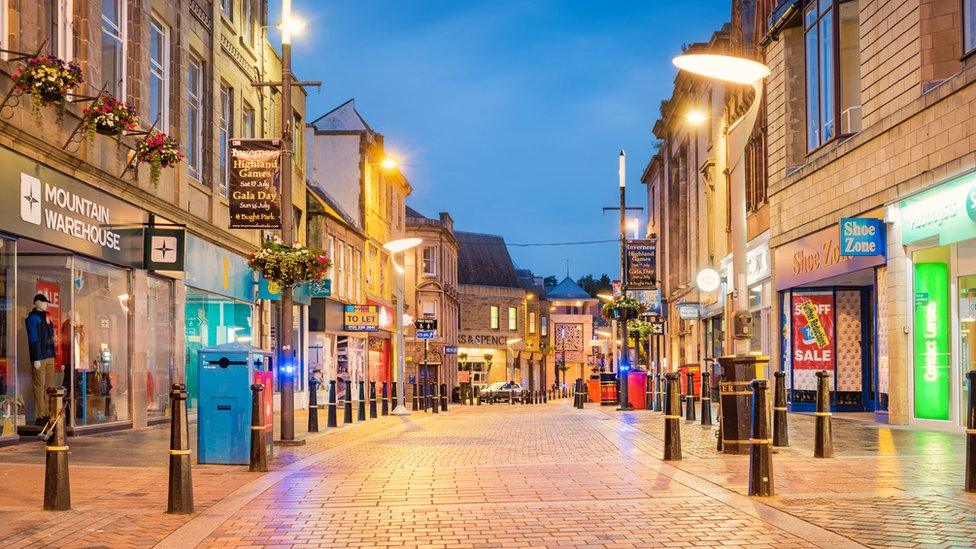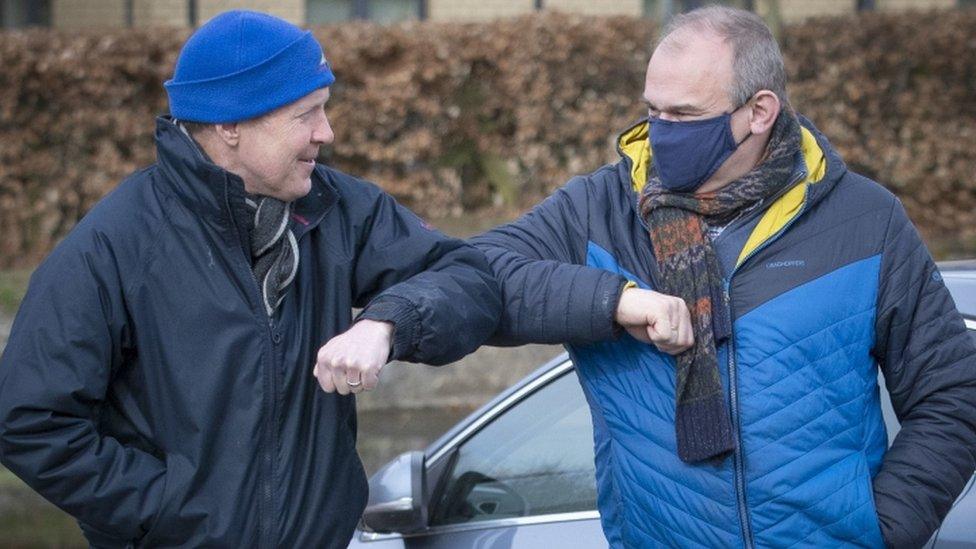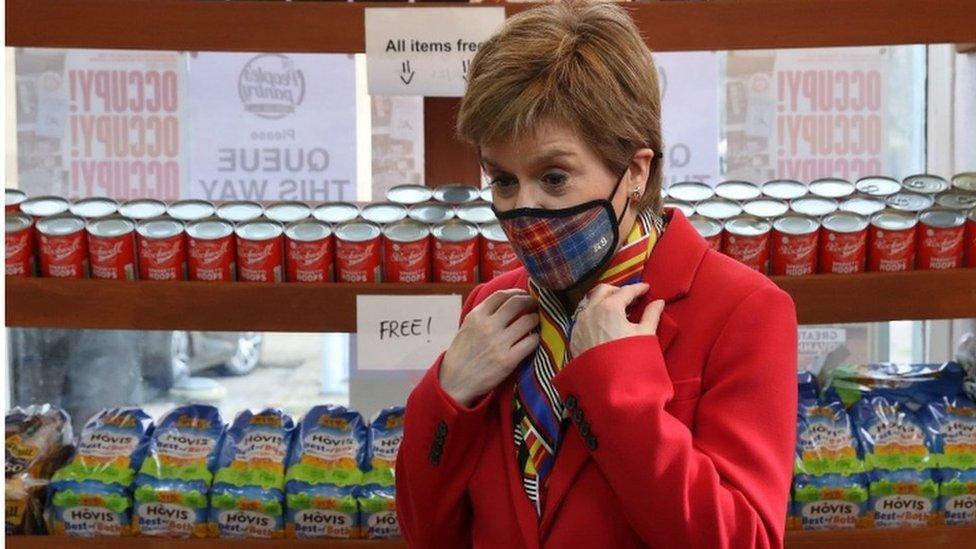Scottish election 2021: Lib Dems pledge tax cut to help high street firms
- Published

Many high street businesses have suffered during coronavirus-enforced lockdowns over the last year
The Scottish Liberal Democrats plan to "shake up" the business rates system in a bid to help high street shops compete with online competitors.
Leader Willie Rennie said the party's proposals would cut bills for most properties around the high street.
Changing the charges to focus on land values would see rises for developers "land banking" sites, he said.
Land banking involves developers buying up sites without developing them, leaving plots under-used or empty.
The Lib Dems' proposals would make the rates payable by the land owner rather than a business based there.
The party says this will avoid penalising businesses that improve their properties, install renewables or make their customers safer with coronavirus mitigation measures.

SCOTLAND'S ELECTION: THE BASICS
What elections are happening? On 6 May, people across Scotland will vote to elect 129 Members of the Scottish Parliament (MSPs). The party that wins the most seats will form the Scottish government. Find out more here.
What powers does the Scottish Parliament have? MSPs pass laws on most aspects of day-to-day life in Scotland, such as health, education and transport. They also have control over some taxes and welfare benefits. Defence, foreign policy and immigration are decided by the UK Parliament.
How do I vote? Anyone who lives in Scotland and is registered to vote is eligible, so long as they are aged 16 or over on the day of the election. You can register to vote online, external.

"The world has changed since business rates were introduced and it's time for our tax system to catch up," Mr Rennie said.
"We believe that high streets are an important part of our communities. They provide meeting points and social opportunities, as well as access to goods and services for those who cannot, or choose not to shop online.
"Making sensible changes to the tax system to back small businesses and create a more level playing field with their online competitors is a no-brainer."

Willie Rennie was joined for a second day of campaigning by Liberal Democrats leader Sir Ed Davey
Mr Rennie, speaking at an Edinburgh food wholesaler, was joined again on the Scottish election campaign trail by Sir Ed Davey, leader of the UK Liberal Democrats.
"The pandemic may have been good for Amazon but it's been devastating for the local businesses that are at the heart of our local communities," Sir Ed Davey said. "Reforming business rates will ensure that online retailers and big developers pay their fair share."
Elsewhere, Scottish Labour leader Anas Sarwar set out measures to help tackle the climate emergency, which he said would save Scots thousands of pounds a year on heating bills and create 7,500 jobs.
These included:
a national housing agency to coordinate the roll out of insulation, double glazing, boiler replacement and renewable heat
a pledge to double the number of homes renovated annually to 80,000
grants to low and middle income households, and interest-free loans to others, to pay for upgrades up to £18,000
a pledge to plant at least 15,000 trees a year
"Climate change doesn't know any borders, so we are on the side of anyone who thinks that our environmental recovery is more important than egos or old arguments," said Mr Sarwar, speaking at a Scottish Power training centre for apprentices making electric vehicles.
"I am an environmentalist and I want the focus of our next parliament to be on averting the climate emergency."

POLICIES: Who should I vote for?
PODLITICAL: Updates from the campaign

In Aberdeen, Scottish Greens co-leader Patrick Harvie called for subsidies to be shifted away from fossil fuels and reinvested in low-carbon alternatives such as renewable energy, which he said would create 100,000 jobs.
Mr Harvie said the UK government had been "absolutely reckless" by investing further public subsidies of up to £16bn in exploration for new oil and gas.
"We are witnessing climate breakdown all across the planet, so we don't have time to ignore the problem," he added.
"The facts are clear; there's far more oil and gas in known reserves than we can afford to use. If we care about our own survival, and about the rest of the living world around us, we need to leave it in the ground."
First Minister Nicola Sturgeon announced plans to provide free school breakfasts and lunches to every primary school pupil in Scotland.
The move would expand the provision already in place for children aged four to seven in primary years one to three.
Ms Sturgeon said this would save families an estimated £650 a year per child.
"That will make an enormous difference to families in every corner of the country - but even this will not be the limit of our ambition," she added.

Nicola Sturgeon was out campaigning in Glasgow in Thursday
The SNP also plans to pilot "free nutritious breakfasts" in secondary schools, leading to the same provision for older pupils.
The Scottish Conservatives, meanwhile, have pledged to commit 10% of Scotland's NHS budget to mental health treatment.
Leader Douglas Ross said the increased funding would amount to approximately £325m.
"So many people have suffered due to the extreme pressures of the past year and the impact on our mental health has been stark," Mr Ross said.
"Society is so much better at talking about and understanding these issues but addressing them is a different matter."
As part of a package aimed at emphasising the importance of physical activity, Mr Ross - a qualified football referee - also backed the UK's bid to host the 2030 World Cup, saying he would "do whatever possible to see the final played here in Scotland".


Do you have a question about the Scottish Parliament election? Use the form below to send us your questions and we could be in touch.
In some cases your question will be published, displaying your name, and location as you provide it, unless you state otherwise. Your contact details will never be published. Please ensure you have read the terms and conditions.
If you are reading this page on the BBC News app, you will need to visit the mobile version of the BBC website to submit your question on this topic.

